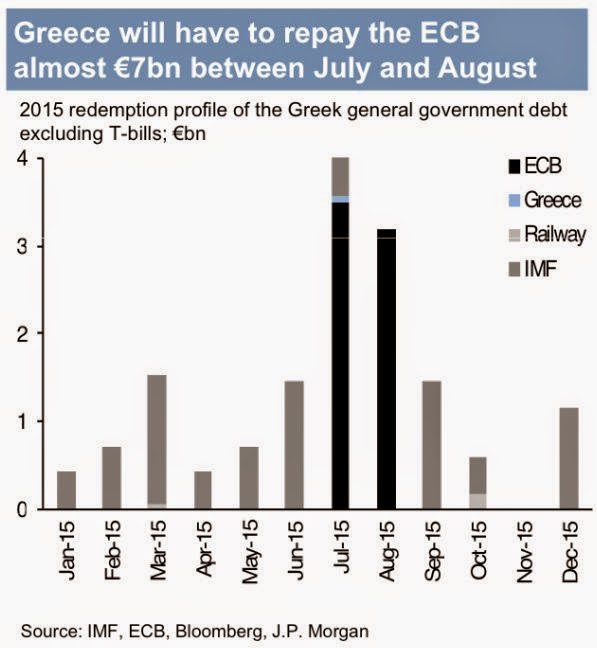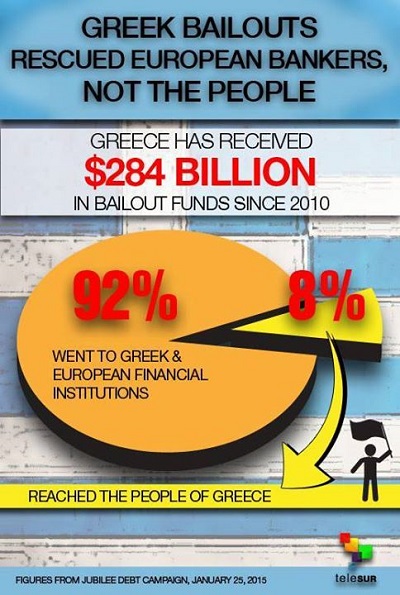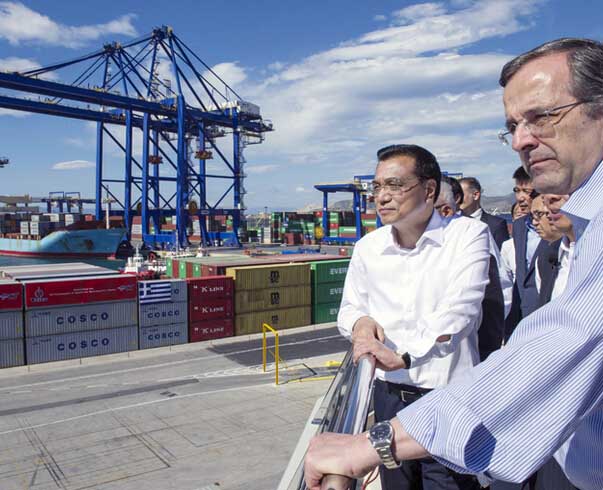笨狼發牢騷
發發牢騷,解解悶,消消愁
希臘屬於西方發達經濟體的一員,實是奇聞。說起腐敗,希臘在世界上是佼佼者,沒中國那麽瘋狂,但程度上一點兒也不必中國差。而且希臘腐敗,那是自下而上的,全國全民參與(民眾不交稅,但要福利)。多年來,希臘完全靠借錢過日子。金融危機後,債主們(主要是歐洲的)緩下來,要希臘還債,勒緊褲帶,全麵砍殺。
當時(五年前),不少人覺得此招不行,但沒有什麽其它辦法,也就上馬了。問題是希臘整個爛爛的,沒人願意吃苦,而德國為主的債主們為了讓自己出的錢還得有人還,也就想方設法維持現狀,撐著。老實說,當時不這麽做,不少歐洲銀行得倒閉。
我對(古)希臘文明頂禮膜拜,常言道,希臘文明是西方文明(也就是世界文明了,西方基本把世界征服了)的鼻祖和基礎,不過羅馬滅了希臘後,像埃及一般,世界就沒希臘什麽事兒了。希臘人民也沒法子,全球化了,競爭不過別人,變成第三世界,幹脆賴著。
希臘腐敗如何,經濟狀況如何,說得多了,不重複了,就列一些圖表。
| 2010 | 2011 | 2012 | 2013 | 2014 | 2015 | 2016 | 2017 | |
| Public Revenue (% of GDP) | 41 | 43.6 | 45.2 | 47 | 46.9 | 45.9 | 44.8 | TBA |
| Public Expenditure (% of GDP) | 52.1 | 53.7 | 53.8 | 59.2 | 48.5 | 45.9 | 43.5 | TBA |
| Budget Balance (% of GDP) | -11.1 | -10.1 | -8.6 | -12.2 | -1.6 | -0.1 | 1.3 | TBA |
| Real GDP Growth (%) | -5.4 | -8.9 | -6.6 | -3.9 | 0.6 | 2.9 | 3.7 | 3.5 |
| Public Debt (billion euros) | 330 | 356 | 305 | 319 | 317 | 316 | 309 | 304 |
| Nominal GDP (billion euros) | 226 | 207 | 194 | 182 | 181 | 187 | 196 | 207 |
| Debt-to-GDP ratio | 226 | 208 | 194 | 182 | 181 | 187 |
(此表來自霧靈十二少的博文)



現在希臘意識到沒路可走了,老實說歐洲的三寡頭(Troika,指歐委、歐行、國際貨幣基金組織三方的欽差大臣)法子也走投無路了(享慣富了,打也沒用),希臘屬於“暴民造反”了,來個真民主。新政府上任,說以撕毀“一切不平等條約”,以前借的錢,重新談。這整個是借錢賴賬,歐洲當然覺得規矩不能改,沒門兒,非還不可。
希臘跑到德國講道理,這麽說的:
“德國百姓,辛苦了,你們欠了錢給我們,花了,謝過了。
我們窮,也懶,又想過好日子,沒法子,隻能借錢。本來借不到的,嘿,你們的銀行還真借給我們,熟話說不花白不花,我們自然吃了喝了。現在要還,我們是勒緊褲帶,就是還不出來,沒法子。我們不好,不應當借錢過日子。不過你們也錯了,責任還挺大的,因為你能明知我們還不起,還借給我們,說實在的,這是活該,錢是要不回來了。
這樣吧,咱兩談談,說說條件,也別指望我全還了。你鬆鬆口,讓我緩過勁來,倒是總要還你點兒的。不然,一鍋端。”
希臘說的有沒有道理呢?有。在歐洲經濟疲弱之際,德國經濟蒸蒸日上,其中一個巨大的原因是貿易順差,歐洲其他國家沒錢,隻能從德國借。德國借了,自然有風險,不過德國企業置之不顧,覺得國家、歐聯撐著,確實屬於不服責任,欠錢的不還,德國企業、銀行應當承擔。所以希臘說的經濟上也有道理。但是,就道義、信譽來說,雙方都屬不服責任(不好聽,無賴)。
希臘債務償還時間表:

如果希臘撒手,各國的損失是多少呢?

比較比較。
中國:赤裸裸、原始的腐敗
希臘:製度下無恥的腐敗
德國:製度下“合理”的資本主義貪婪掠奪,“合法的”腐敗
希臘還真夠賴的,希臘百姓既要撕毀“一切不平等條約”,但也要留在歐盟、歐元區,繼續享受“發達國家的地位”。
那德國,也沒什麽好的說:

就是說,給希臘的援助對“救濟”銀行去了。
這一攤子,夠歐洲理的了。目前,雙方都沒有讓步的意思,因為誰先退一步,馬上被動。
慢慢看戲。
【後記】
2015年02月12日
(鳳凰)李克強總理致電邀請 希臘總理將出訪中國尋求投資
(觀察者網)外媒稱希臘新總理已接受訪華邀請 將會見李克強
(大公網)中俄向希臘伸橄欖枝 中國在意港口投資勿生變

2015.01.31法新社
Greece's Piraeus port U-turn will not hurt China investment: analysts
2014.11.20華爾街日報
Chinese Transform Greek Port, Winning Over Critics
Cosco-Built Container Terminal in Piraeus Marks Public-Relations Victory for Beijing
PIRAEUS, Greece—When state-controlled China Overseas Shipping Group Co. arrived here five years ago, it was met with a month-and-a-half-long dockworkers’ strike and a banner along the waterfront: “Cosco Go Home.”
Today, a new Cosco-built container terminal supports 1,000 jobs, silencing most union unrest. After pumping in a billion dollars and promising another half billion, it has also transformed the port, just outside of Athens, into one of the biggest and fastest-growing in the Mediterranean.
The investment now ranks as one of the most successful Greek privatizations in recent decades. It also has delivered a rare public-relations victory for Beijing. Critics have accused China-backed firms of overpaying for a number of big resource plays in the developed world—from oil fields in Canada to mines in Australia—and then bungling their management.
Industry watchers say Cosco probably overpaid in its Greek gambit, too. But its transformation of the Piraeus container terminal is being hailed an operational success so far, for both the company and the port.
Cosco, founded in 1961 amid China’s Great Famine, bet big on Greece after a decade of minority investments in a handful of foreign ports—in Singapore, Suez and Antwerp. Its investment in Piraeus has helped catapult the company into the major leagues of global port operators, alongside the APM Terminals unit of Danish shipping giant A.P. Moeller-Maersk A/S and Dubai-based DP World.

The investment has also been a boon to Piraeus, a struggling port scarred by decades of industrial decline and the country’s protracted debt crisis. The port’s proximity to Athens makes it the busiest passenger harbor in Europe, a leading cruise-ship terminal in the Mediterranean, and unofficial home port to the biggest merchant fleet in the world.
“We are successful in Piraeus,” said Fu Cheng Qiu, chief executive of Cosco’s Piraeus subsidiary. Things didn’t look promising back in 2009, when Cosco first arrived, he said: “There was the financial crisis; we had no business.”
After a few years of talks between Greek and Chinese officials, Beijing committed to making Greece a hub for Chinese exports. In 2008, Cosco put in a €490 million ($620 million) bid for a 30-year concession. Some industry and government officials familiar with the deal said the offer was about five times the market value of the concession.
Cosco has since tried to revisit the terms of the deal. The concession has been extended to 35 years, and the current government recently consented to an agreement that would allow Cosco to expand its operations. It has granted it the rights to build a third wharf at the container terminal, without going through a competitive tender.
In October 2009, when Cosco took control of the container terminal, Greece’s militant dockworkers union, emboldened by the incoming socialist government that would win elections a few days later—launched a six-week-long strike that crippled the port.
The strike left some 4,500 containers stranded at the terminal for weeks, and dented Greece’s already wobbling economy.
The Greek government, Cosco and the Piraeus Port Authority agreed to a deal that helped restore labor peace on the docks. Cosco was allowed to operate its part of the container terminal unfettered by the union wage scales. Most of Cosco’s workers are now hired through a third-party, nonunionized employment agency.
They earn around €1,200 a month, a better-than-average wage in Greece, but roughly a third of what unionized dockworkers earned five years ago, and less than what workers still earn at the rival PPA-controlled wharf abutting the Cosco docks.
The new jobs have helped reduce labor unrest. But some powerful opponents still complain about the deal.
“They have created a workers’ ghetto,” said Panagiotis Lafazanis, a senior member of Parliament with the main opposition, radical-left Syriza party.
Meanwhile, Cosco has further plans to expand—moves that the company expects will boost volumes to more than six million containers by 2016. Cosco has installed 11 new loading cranes that will put its Piraeus operations roughly on equal footing with capacity at Rotterdam, Antwerp and Hamburg, Europe’s three busiest container ports.
“They are excellent at long-term planning,” said Athanasios Christopoulos, secretary-general of ports and investment policy at Greece’s shipping ministry.




